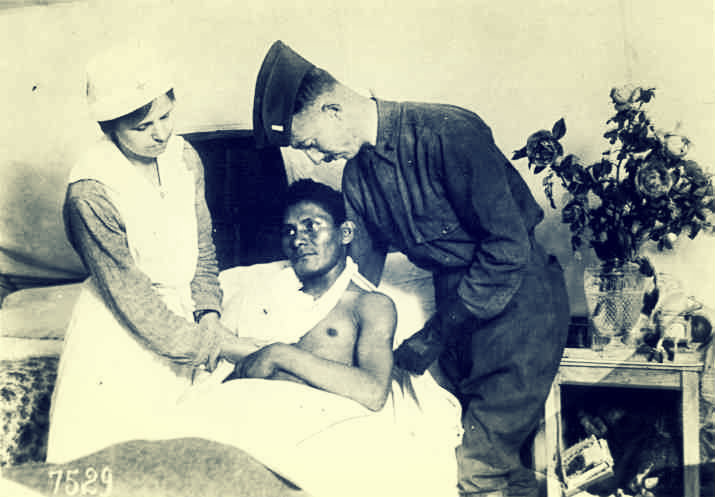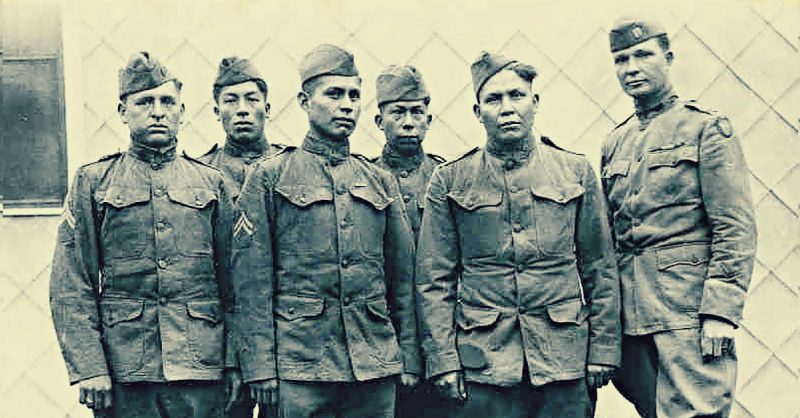Using the language of Native Americans for military purposes did not just happen during the Second World War; World War One had its share of code talkers who paved the way for other Native American code talkers during the second worldwide conflict. These WWI Code Talkers were men from the Choctaw tribe.
It all started when the German kept on breaking the US military codes during the First World War. So, the latter decided to use a “weapon” they already had on hand — the Choctaw soldiers who were already in the army to use their own language for the military codes. It worked as the Choctaw’s native language stumped the enemy.
Ironically, while the Choctaw soldiers became the military’s vital code talkers in the French battlefields during the Great War, the tribe’s children back home in Oklahoma were being punished – whipped – for speaking their native language in their schools.
The Birth of the Choctaw Military Codes
Autumn of 1918 — the US armed forces were involved on the Western Front particularly in the Meuse-Argonne Offensive. It was one of the major frontline commitments US soldiers had during the Great War. However, the army’s existing communications during that time in the battlefields had been compromised as the enemies – the Germans in particular – were able to tap into telephone lines and were deciphering the codes made by the US army. Runners for the US army who were sent to deliver the messages directly were also being repeatedly captured.
The US was in a stale state, so it seemed. As the American Indian Collections curator at the Oklahoma History Center, Matt Reed, pointed out, what the Jerries did that time created a massive problem for the Americans without any way of getting out of it.
It was a US captain that came up with the solution . . . BY CHANCE.
This said US captain was walking by when he overheard two Choctaw soldiers of the 142nd Infantry Regiment in deep conversation in a language he couldn’t understand. Intrigued, he walked up to them and asked what language they were using. The pair responded by saying it was their own native one, the Choctaw language. When he realized that it had a potential for communication within the US army, he went on to ask the two soldiers if there were other Choctaw natives within the US troops. The men said yes and went on to say that they knew of Choctaw soldiers working in the headquarters of the company.
So, using a field telephone, the captain asked the men to deliver a message using their native tongue to their colleagues. The latter, then, translated the delivered message to English.
The test was a success and gave birth to the Choctaw Telephone Squad. It was the start of code talking.
Puzzling the Enemy
According to Dr. William Meadows, the only academic to have studied the Choctaw code talkers of World War One and who has written extensively about their involvement during the said conflict, using the Choctaw native tongue had great advantages.
For one, Choctaw was relatively a little known language. Only a few American Indian tribes had populations that exceed beyond 20,000, thus, resulting to their languages being not widely spoken with most not written down. The Missouri State University academic went on to say that when a certain native tongue was indeed written, it was usually only the Bible and a number of Christian hymns and these materials were used locally.
Within hours after the test, Dr. Meadows said, eight Choctaw speakers were dispatched to several strategic positions. These WWI code talkers, then, went on to help the US win a number of key battles during the Great War.
The Choctaw native tongue did not cover many terms used in the military resulting to the creation of coded words. For example, as there was no specific Choctaw word for “machine gun”, the phrase “little gun shoot fast” was used. Additionally, the number of corn grains were employed for battalions. The Choctaw code talkers were able to spawn a code within a code which made the messages more impenetrable.
The use of the Choctaw language for military messages within the US army stumped the Germans. So flabbergasted was the enemy that weird theories started to come out about it. One was the belief that the Americans were able to invent a device that allowed them to speak underwater.
All in all, 19 Choctaw soldiers were recruited and employed in the telephone squad. Meadows said that these soldiers came from the 141st, 142nd and 143rd Infantry Regiments and most came from the Oklahoma area.
While the Meuse-Argonne Offensive turned out to be the Allied forces’ final campaign on the Great War’s Western Front, the Choctaw code talkers did pave the way for the use of other Native American dialects as military codes in following global conflict, the Second World War, with the Comanche and the Navajo code talkers being the most famous.

Dr. Meadows, who authored The Comanche Code Talkers of World War II, said that there were two types of code talking used in both global conflicts. The first one used the native tongue to devise special military terms while the second one just used the native language as it was already spoken. Meadows added that uintil now, it is believed that not one of the codes and native languages used in both wars had been broken by the enemies.
The Dark Side
Ironically, while the Choctaw code talkers became very important in the campaigns undertaken by the US on the Western Front of World war One, their native language was in so much pressure back home. The WWI-era was also the time for cultural assimilation in the United States. This meant that the US government attempted to “civilize” the American Indians. These civilization attempts included enrolling the natives’ children in boarding schools ran by the state where they got severe punishments if ever they speak their own dialect.
Judy Allen, senior executive officer of tribal relations with the Choctaw Nation of Oklahoma, described those times as “crazy”. She even believed that the two Choctaw soldiers, upon being approached by the American officer while conversing in their native tongue, may have thought they were in trouble for doing so rather than about to becoming a solution to a huge problem faced by the US army during the Great War.
Like other native American Indian tribes, the Choctaw’s way of living was under threat because of the implementation of assimilation. Not only were they forbidden to speak their own languae, they were also removed from their ancestral land.
But when the US officially entered World War One and the need for army recruits came, the Choctaw men responded positively, signing up to serve their country.
Meadows even went on to say that there was only one adjective fit to describe the Choctaw code talkers of WWI — gracious. They did not have to share what they had specially since they were forbidden to use it in the first place but they did. They were extremely proud of their own language.
Incognito
While all of the Choctaw code talkers of WWI went home safely to their families after the end of the war, their efforts went unrecognized and their deeds were relatively unknown outside of the tribe. There were even cases when their own families and wives knew little or nothing at all about the roles they played in the conflict.
Nuchi Nashoba, president of the Choctaw Code Talkers Association, said that it was not a Choctaw’s way to talk about one’s own achievements so, the soldiers kept mum about it. Even her own great-grandfather, Ben Carterby, who had been one of the soldiers used in the test before the forming of The Choctaw Telephone Squad, hardly speak about his time in the war. Nashoba cited one instance when he was interviewed by a local publication. All he said was, ‘I went to France, I saw the country and I came back alive’.
Furthermore, the use of the Native Americans’ languages for military purposes was a sensitive issue for the government. Not only did the top officers of the US army suppressed the information after seeing the great potential of code talking as they did not want the strategy to become widely known, it was also hard to explain why they were using the very same languages in the front lines of battles when they were trying to eradicate their use back home.
Another thing was, it wasn’t until 1924 when the American Indians got their US citizenship. It was already years after WWI ended and yet, though they weren’t recognized as official US citizens, over 12,000 Native Americans fought in the battle.
Recognized At Last
https://youtube.com/watch?v=4c9FVOxmnPI
If the Choctaw code talkers paved the way for code talking in war, it was the Navajo code talkers of World War Two that paved the way for the various code talkers of both wars to get the recognition they deserved.
After the declassification of their code in 1968, the Navajo code talkers gained the attention of the public and went on to receive congressional recognition as well as silver and gold medals in 2001.
The attention the Navajos were receiving at that time sparked renewed interest in other American Indian code talkers like the Choctaws of WWI. The relatives of the Choctaw soldiers gathered the necessary documents and campaigned hard for them along with the other tribes whose native languages were also used for military codes during the wars.
Because of their efforts, the French government awarded the Chevalier de L’Ordre National du Merite [Knight of the Order of national Merit] to the Choctaw code talkers of WWI and WWII as well as the Comanche code talkers of WWII posthumously in 1989.
Then finally, in 2008, the US recognized the contributions made by the American Indians and their own native languages during the global conflicts through the passing of the Code Talkers Recognition Act. This legislature acknowledged the hundreds of overlooked code talkers coming from the various tribes. November of 2013, each tribal government became the recipients of Congressional Gold Medals with each bearing a design unique to each tribe. Each code talker’s family also received a silver replica of these said medals according to the tribe they belonged to.
As Dr. Meadows put it, not all great things come from design; some come by accident just like how the US captain, by chance, heard two Choctaw soldiers conversing in their language that made way for code talking in war.
